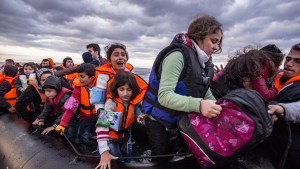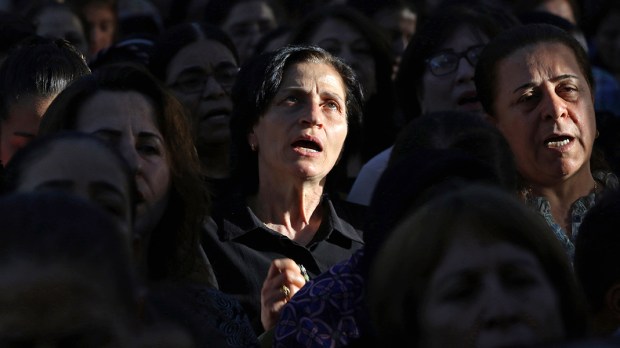The size of the Christian community in Iraq could drop to just 23,000 by 2024 — just 20% of the population on the Nineveh Plains before the Islamic State group attacked in 2014 — according to a new report.
The number represents a fraction of a once-vibrant community that traces its roots to Apostolic times. Numbering about 1 million in the days before the first Gulf War, the community has since been decimated by war, economic turmoil and jihadism.
Aid to the Church in Need, which conducted the survey and issued the report, “Life after ISIS: New challenges for Christianity in Iraq,” said the trend would move the Christian community from the category of “vulnerable” to the critical category of “endangered with extinction.”
The study identifies the major challenges facing Iraqi Christians who returned to their hometowns on the Nineveh Plain, after fleeing the region for Kurdistan, following the ISIS invasion of the region in 2014.
According to the report, all Christians living in the area mention a lack of security, and 87% indicate that they feel it “very much” or “remarkably.” Almost 70% of Christians cite violent activity of local militias and the possibility of a return of ISIS as the main reasons for this fear; 69% say this is the primary reason why they may emigrate.
In addition to concerns about security, Christians list unemployment (70%), financial and administrative corruption (51%) and religious discrimination (39%) at the social level as the major challenges that continue to push Christians toward emigration.
In the wake of the fight against ISIS, Aid to the Church in Need helped restore 2,860 damaged or destroyed Christian homes in six cities and villages on the Nineveh Plains. The international Catholic pastoral aid organization’s reconstruction plans have entered a new phase, aiming to rebuild the infrastructure of Church-run facilities. The 363 buildings include churches, educational facilities, orphanages, residential care homes, clinics, as well as accommodation for staff, for example women religious who serve as teachers and nurses.
Edward Clancy, director of outreach for ACN-USA, spoke with Aleteia about the new report.
Why would Aid to the Church in Need conduct such a survey?
We’re invested in the survivability and survival of Christianity in Iraq and the Nineveh Plain, so understanding the demographics, understanding the hearts and minds of the people is very important. It’s not our point to push anything on them, but to help them by responding to needs and understanding what those needs are.
What can you tell me about some of the people and what they are facing?
We were helping a small shop owner back in 2018 or so. At the time, he was talking about his excitement to have his home rebuilt and move back in and rebuilding his business. He didn’t want to leave.
Since then, he was one of the people who have expressed severe disappointment about what has happened, that it’s been such a struggle. People like him are saying “How long can we do this?”
The statistic that jumps out is the youth unemployment and the number of people who have changed their mind about staying. There’s now something like a 67% unemployment rate for those 25 and under. Obviously, one of the key components of the genocide declaration for the region was the fact that they were destroying future generations by preventing marriages and families. Of course, if this happens, if two-thirds of those 25 and under leave, as they seem to express willingness to do, we’re talking about depopulation, and a future depopulation, because if the young people go, there’s not going to be much of a future. Then it becomes an unsustainable population, practically kind of a life-support situation. There are a lot of things going on behind the scenes that seem to indicate there are problems not being dealt with. There’s a sort of hidden boycott of Christian businesses — that’s their allegation — and it seems to be borne out by the fact that you have a highly educated Christian community with a history in business, with all of these advantages, and having higher unemployment and much higher underemployment — working in jobs that are not their skill set. Christians are not afraid to take jobs that their skill sets don’t fit, for the sake of working, but by the same token, they’re not given the opportunity to go back to their sort of normal livelihoods. So it doesn’t portend for a very good future.

Read more:
After the US Has Declared ISIS Guilty of Genocide, What Next?
And the biggest thing is security. Everybody is tense. You have militias that are backed by Iran that are causing trouble in the region, and the government is allowing them to exist because they helped with the ouster of ISIS. But at what cost?
We have the impression that ISIS is gone. Why should there be a problem anymore for Christians to live there?
One of the issues is the return of ISIS. Many people that we speak to say they just took off their uniforms and disappeared, but they’re still present in Iraq. The international fighters might have gone elsewhere to fight but would return if conditions allow.
It’s pretty universal whenever you speak to priests or people in Iraq. They say ISIS is just not visible.
After the Second World War there was an effort to oust the Gestapo and members of the SS and Nazi insurgents. There was a real effort to remove them. I don’t know if that has happened in Iraq. At least, that’s not what the Christians are saying. There’s no effort of finding these people, removing them, and if they’ve committed war crimes, trying them and if necessary imprisoning them.
And people have said in the past that the mentality that led to ISIS’ rise is still there.
Yes — which is one of the points of this quiet boycott of Christians. There’s an effort to crush and disable Christian businesses. We’ve heard stories of Christian businesses being hassled by the militias, interfering with business deliveries, things like that.
You say “The international community must take immediate and decisive action to tackle the problems which are threatening the continuing Christian presence in Iraq.” What action do you propose?
There’s got to be definitely an international diplomatic pressure put on the government of Iraq, and with any formation of future governments, there has to be a Christian presence. Again, because of the depopulation, the Christians now are very vulnerable; they don’t have the numbers to sustain themselves. And if they don’t have representation, they will be pushed out. It will be done progressively, to the point where Christians will be an afterthought. It will be a historical reference, not what it should be, which is Christianity is a foundation of Iraq.
When I spoke on a panel at the United Nationsabout ““Preserving Pluralism and Diversity in the Nineveh Region” in 2017, the ambassador from Iraq to the United Nations came over to me and said “Iraq without Christians is not Iraq. Iraq without Yazidis is not Iraq. Iraq without Muslims is not Iraq.” Then he said the same thing to the people at the conference.
They say Christians are an important part of Iraq, but actions speak differently.
Some of the things Christians have contributed to Iraq is that they were the ones who translated all of the important stuff for the original Muslim regimes into Arabic from Greek and other languages. So their knowledge of everything outside of the Quran comes from Christian scholars, who helped them to learn.
So it’s not a small part. And obviously you have these Churches that go back hundreds of years before the presence of Islam. It’s a society that was evangelized by the Apostles. That’s something we don’t want to see disappear.
Why should your findings matter to us?
When I was visiting World Youth Day in 2012, one of the auxiliary bishops of Baghdad, when we had a meeting and discussion with him, I introduced myself as being from Aid to the Church in Need USA. He said, “Oh, America, which caused us these problems.” In a sense, it’s for America, who broke it, to do something to fix it. We’ve played a role in their situation. We played a role in what has happened to the Christian community, so America does have some culpability in this.
And as Christians, as Catholics, it’s important to remember that everything we have is handed down to us. All of our history, all of our faith, all of the practices, everything we know. What we know about Jesus Christ was handed down from one generation to another, from this region, from these very grounds in the Middle East. So even though this is not Jerusalem or Bethlehem, it’s not that far away, it’s not that out of the range of the Apostles, and it’s something we should honor.
And more importantly than anything, a Christian presence in Iraq would help it to rebound, would help it to grow. Everywhere there’s been a Christian presence, Christians act as, if you will, the mortar between the bricks, or the communicators between disparate parties. When there were problems between the Shia and Sunni, oftentimes it was Christians who would mediate, because they were able to talk to each, and do it because it is our Christian duty to treat all well and speak the best of people. So that’s a philosophy that should remain there. It would definitely help in building peace and rebuilding society.
And I think, lastly, the fact that Christianity in the world is being oppressed, is being attacked, and it’s being done in multiple places around the world — Nigeria, West Africa, China and other parts of Asia. It’s a lot of places, but we do have to do something. As Christians we can’t let our brothers and sisters suffer. We have to let them know that we support them, we have to support them in our actions, in our prayers, and in the words that we tell people: we have to spread the word.

